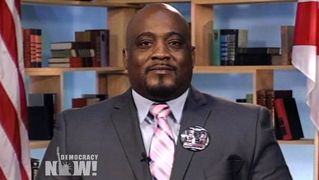
Topics
By Amy Goodman & Denis Moynihan
“I found myself standing in front of railroad tracks in South Florida. I was waiting on the train to come so I could jump in front of it and end my life.” So recounted Desmond Meade, describing his life nine years ago. He was homeless, unemployed, recently released from prison and addicted to drugs and alcohol. The train never came. He crossed the tracks and checked himself into a substance-abuse program. He went on to college, and now is just months away from receiving his law degree.
Meade, however, will not be able to practice law in Florida. As a former felon, he cannot join the bar. That is one of his rights that has been stripped, permanently, by Florida’s draconian laws. In a democracy, if one wants to change a law, you vote for lawmakers who will represent your views. Yet, as an ex-felon in Florida, Meade also has lost the right to vote for the rest of his life.
It’s called “felony disenfranchisement,” and is permanent in 11 states: Alabama, Arizona, Florida, Iowa, Kentucky, Mississippi, Nebraska, Nevada, Tennessee, Virginia and Wyoming. It’s enforced in differing degrees, like a patchwork, across the U.S. In 13 states and the District of Columbia, you get your rights back upon release from prison. In others, you have to get through your probation or parole. In Maine and Vermont, prisoners retain the right to vote, even while incarcerated.
U.S. Attorney General Eric Holder addressed the issue this week at a legal symposium at Georgetown University:
“Across this country today, an estimated 5.8 million Americans—5.8 million of our fellow citizens—are prohibited from voting because of current or previous felony convictions. That’s more than the individual populations of 31 U.S. states.” Close to 6 million Americans, denied the basic right to vote. Because of the racial disparities in our penal system, African-American and Latino men are vastly disproportionately denied the right to vote. Holder continued, “The current scope of these policies is not only too significant to ignore—it is also too unjust to tolerate.”
The Georgetown event was co-sponsored by The Leadership Conference, a coalition of civil-rights, legal and human-rights groups. Last September, the group released a report titled “Democracy Imprisoned.” In it, the group writes, “Florida’s disenfranchisement rate remains the highest and most racially disparate in the United States.” It is no coincidence that this key swing state is home to more than 1 million of the nation’s nearly 6 million disenfranchised.
Former Florida Gov. Charlie Crist eased the laws, making the application for the reinstatement of rights automatic. But in 2011, his successor, Republican Gov. Rick Scott, imposed a waiting period of at least five years for anyone to apply to the clemency board. Meade told us on the “Democracy Now!” news hour: “Even after applying, the processing time for the application takes upwards of six years. So, in reality, an individual will have to wait anywhere between 11 to 13 years just to see if they have a chance, a shot, at getting their rights restored.” Crist has switched parties to run for governor as a Democrat against Scott.
Law professor Michelle Alexander opens her groundbreaking book, “The New Jim Crow: Mass Incarceration in the Age of Colorblindness,” with the story of Jarvious Cotton: “Cotton’s great-great-grandfather could not vote as a slave. His great-grandfather was beaten to death by the Ku Klux Klan for attempting to vote. … His father was barred from voting by poll taxes and literacy tests. Today, Jarvious Cotton cannot vote because he, like many black men in the United States, has been labeled a felon and is currently on parole.”
At a national level, bills are being proposed that would guarantee voting rights for ex-felons, with both Democrat and Republican support. After Holder, Republican Sen. Rand Paul of Kentucky spoke at Georgetown, advocating for full voting rights. But it is still an issue over which states exert enormous control.
Desmond Meade is not sitting around waiting for his rights to be handed back to him. He is organizing. He currently serves as the president of the Florida Rights Restoration Coalition, with close to 70 groups pushing for reforms of the state’s disenfranchisement laws:
“It’s about humanity. It’s an all-American issue. It’s not about Democrat or Republican. It’s about the common decency of letting an individual or helping an individual to reintegrate back into their community so they can become productive citizens and enjoy life.”
We can all be thankful that the train he was waiting for that fateful day never came.
Amy Goodman is the host of “Democracy Now!,” a daily international TV/radio news hour airing on more than 1,200 stations in North America. She is the co-author of “The Silenced Majority,” a New York Times best-seller.
© 2014 Amy Goodman
Distributed by King Features Syndicate











Media Options